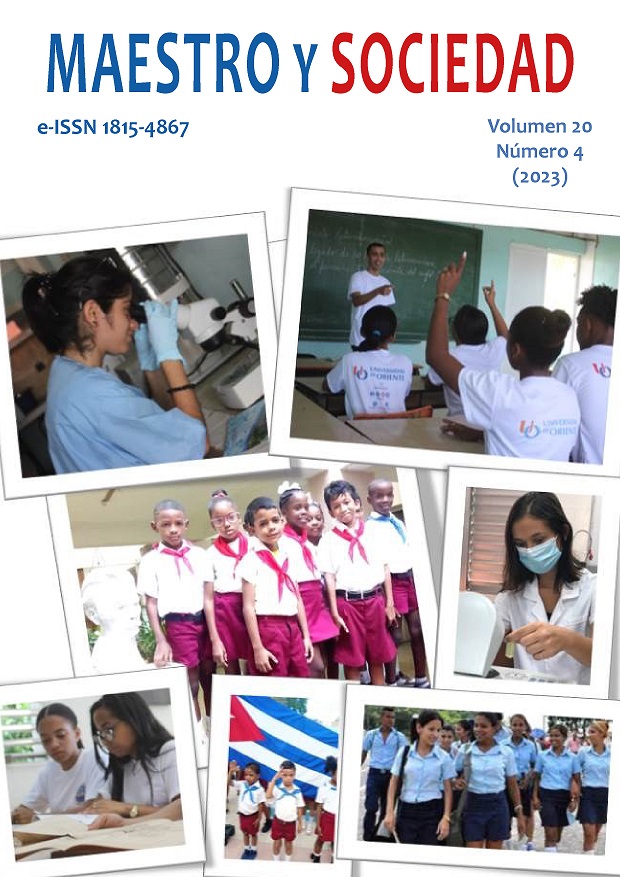Didactic treatment of the contents of Analytical Chemistry: contribution to food security and sovereignty
Keywords:
Analytical chemistry; elective curriculum; food sovereignty; food securityAbstract
Introduction: The training of the professional is a dynamic action because it responds to the continuous linkage of the university with society; hence the need for the socialization of knowledge and sustainable education around food issues. The Ministry of Higher Education methodologically directs and controls in undergraduate and postgraduate education the
insertion of topics related to food sovereignty and education. The optional-elective curriculum of the Chemistry course at the Universidad de Oriente offers the optional subject, Analytical Chemistry of Food (QAA). The content system includes
the treatment of food and nutritional sovereignty and security from the point of view of chemical analysis. Objective: to analyze how the didactic treatment of the contents of the QAA subject responds to food security and sovereignty
from the undergraduate formative process Materials and Methods: the theoretical methods of analysis and synthesis, induction-deduction, observation and the historical-logical method were used. The survey and documentary analysis
were the empirical methods used. Results: It was revealed that the QAA from the undergraduate level consolidates and integrates fundamentally the knowledge of analytical chemistry, to respond to aspects related to quality, safety and
nutritional value of food, taking into account the civic, legal and environmental safety. Forty-nine percent of the total hours of the discipline Analytical Chemistry contribute to QAA. Conclusions: the incorporation of the optional subject QAA in the curriculum is pertinent, integrative and contextualized to current times. The didactic treatment of the topics under study is very motivating, novel and favors the consolidation of the professional skills of the Chemistry career.
References
Asamblea Nacional del Poder Popular (ANPP). (2022). Ley de soberanía alimentaria y seguridad alimentaria y nutricional. http://www.gacetaoficial.gob.cu/GOC-2022-754-O77.
Avilleira, I., Casanovas, E., y Suárez del Villar, A. (2021). La seguridad alimentaria: evolución del concepto y su expresión en el contexto cubano. Revista Científica Agroecosistemas, 9(3), 159-167.
Casas, J., Repullo, JR. Y Donado J. (2003). La encuesta como técnica de investigación. Elaboración de cuestionarios y tratamiento estadístico de los datos (I). Atención Primaria, 31(8), 527-38.
Comisión Nacional de Carrera de Química (2016). Plan de Estudio E de la Carrera de Licenciatura en Química. Universidad de La Habana. http://www.uh.cu
Guevara, O., Hernández, F., De la Cruz, R. y León, N. (2019). Contribución a la seguridad alimentaria en el municipio de Cabaiguán. Revista Iberoamericana Ambiente & Sustentabilidad, 2(2), 32-43. https://doi.org/10.46380/rias.v2i2.47
Martínez, M. G., Mercado, G., Rivera, E. y Méndez, V. (2020). Aspectos que influyen en el desarrollo de la seguridad alimentaria en el sector social. Población y Desarrollo, 26(51), 51-70. https://doi.org/10.18004/pdfce/2076-054x/2020.026.51.051
Moreno, A. P. H. (2020). Contextualización del concepto de inocuidad en el concepto de seguridad alimentaria y nutricional. Alimentos Hoy, 27(48), 27-50.
Organización de las Naciones Unidad para la Agricultura y la Alimentación (FAO). (2018). El estado de la seguridad alimentaria en el mundo: fomentando la resiliencia climática en aras de la seguridad alimentaria y la nutrición. http://www.fao.org/3/i9553es/i9553es.pdf
Vargas, R., Saldaña, D. y López, L. (2017). Investigación en Química Analítica aplicada a la Nutrición como una herramienta en docencia. Educación Química, (28), 127-130. https://doi.org/10.1016/j.eq.2017.01.004
Published
How to Cite
Issue
Section
License
Copyright (c) 2023 Sandra Crombet Grillet, Arelis Ábalos Rodríguez, Norma Pérez Pompa, Roger W. Pérez Matos, Librada García Leyva

This work is licensed under a Creative Commons Attribution-NonCommercial-NoDerivatives 4.0 International License.
This journal provides immediate open access to its content, based on the principle that offering the public free access to research helps a greater global exchange of knowledge. Each author is responsible for the content of each of their articles.



























 Universidad de Oriente
Universidad de Oriente 